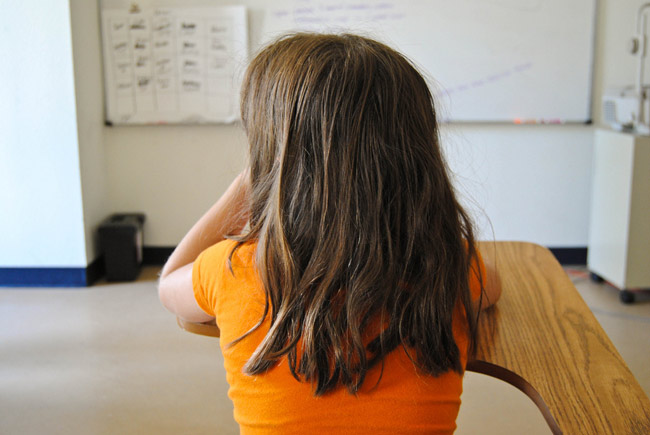
By Julie Delegal
Florida’s schools have been graded since FCAT began under Gov. Lawton Chiles in 1998. There weren’t any consequences for the first few years — no “turnaround” lists, no teacher bonuses — as schools were given the chance to adjust to the brand new test.

This year, Jacksonville’s first round of grades brings good news and bad news. Yes, Duval County’s elementary and middle schools have earned more A’s, but they’ve also earned more F’s — 22 of them, total. And six of those F’s belong to charter schools.
Charter schools are hybrid entities. Private educational groups run charter schools using public money. The private educators, in turn, pay leases to the property owners and/or fees to the franchise.
An example is Charter Schools USA. In a profile of its CEO, Jonathan Hage, Florida Trend magazine reports that once a charter school is on its feet, CSUSA takes roughly 10 percent of the per-pupil tax dollars that come through the door. In Florida, charter schools receive about two-thirds of the per pupil funds that traditional schools receive. The schools collect capital improvement funds from the state for site-related needs, and they don’t pay property taxes, even though the real estate sites are privately owned assets.
Charter schools were supposed to be the superheroes of education. “Give parents a choice,” proponents said. “Loosen up on the regulations. Let us innovate and show you what we can do; we’ll bring those innovations to the public school classroom.”
In Jacksonville, with its areas of almost intractable poverty, it’s easier said than done. While some school-grade calculations are still pending, 32percent of Jacksonville’s elementary and middle charter schools graded so far this year have earned F’s.* By contrast, so far, only 12.5 percent of Duval’s traditional public schools scored F’s this year. Speaking in proportionate terms, and without accounting for sample sizes, Jacksonville’s charter schools, as a district, have 2 ½ times the number of failing schools than do our traditional-district schools.
![]() We are paying for it dearly — not only in terms of student failure, but also in terms of diffused resources. Test-based accountability is a little too high-stakes in Jacksonville as compared to our nearest-peer district, Hillsborough. (Hillsborough County is exempt from the provisions that count test-scores as 50 percent of teachers’ evaluations.) Nevertheless, standards-based accountability permits educators to zero-in on students’ specific academic needs in order to better serve them.
We are paying for it dearly — not only in terms of student failure, but also in terms of diffused resources. Test-based accountability is a little too high-stakes in Jacksonville as compared to our nearest-peer district, Hillsborough. (Hillsborough County is exempt from the provisions that count test-scores as 50 percent of teachers’ evaluations.) Nevertheless, standards-based accountability permits educators to zero-in on students’ specific academic needs in order to better serve them.
That’s harder to do, though, when privatization is draining precious dollars from traditional schools, whose scale operational costs remain roughly the same despite losing students.
Superintendent Nikolai Vitti told the Jacksonville Times Union that the district’s traditional schools lost $70 million in pupil funds last year due to privatization — charter schools, voucher schools, and other “contract” schools.
Despite the financial crunch, though, Duval’s traditional district schools outperformed charters on the “A” end of the grading scale, too. So far, 23percent of our traditional district elementary and middle schools earned “A” grades, compared to just 10 percent of Duval’s charter schools. Jacksonville’s traditional public schools also beat charters on passing grades, that is, the percentage of schools scoring A’s, B’s, and C’s: Sixty-six percent of graded traditional schools “passed” so far compared to only 58 percent of charters.
The idea that charter school operators should make a profit by providing children a better educational experience should offend no one. The fact that the numbers say they’re not doing a better job, while they’re draining away precious public resources, should alarm everyone.
![]()
* All figures were retrieved on July 17 from Jacksonville Public Education Fund’s interactive website. Only already-graded schools were included.
Julie Delegal, a lifelong Floridian, is a contributing writer for Jacksonville’s Folio Weekly and a ContextFlorida columnist.





























confidential says
The pretty high taxes I pay for schools were supposed to be for our children’s education and not to fatten the pockets of for profit charters, thanks to the conservative agenda of total privatization to benefit the elitet!
My children, today grown up successful adults, law abiding and free of substance went to good old traditional public schools and even when they started in the midst of forced bussing for integration in Raleigh NC in the early 70’s, had normal and successful schooling. So why, we the people majority allow a for profit minority special interest to take away form our public schools to fund ever failing charters! We are not supposed to expect to send our kids to charters to be babysit but instead to traditional public schools “to learn” and parents bare 50% or more of that traditional school education. Do not blame the public school and the teachers for the lack of parental supervision and good home guidelines. Most children copy what failing parents do at home, drink, smoke, weed etc. etc. Is not our traditional schools and teachers fault!
Johnny Taxpayer says
My children attend a small charter school for 3 main reasons, 1) Required Uniforms 2) Mandatory parental involvement and 3)small school size. The particular charter school my children attend didn’t score as high on the latest FCAT as the traditional public school they are zoned for, will that change my mind in deciding to send them there? Absolutely NOT. Mrs Taxpayer and I are primarily responsible for our childrens’ education, the school they attend is a very distant second in that regard. But a school that mandates parental involvement, has mandatory uniforms, and has proven to me to be a very safe and a much superior environment for them to learn in than the alternative big box warehouses masquerading as elementary schools, more than makes up for not scoring as well on a single ridiculous assessment test. An assessment test, by the way, that almost everyone agrees is a gigantic waste of time and resources, except for when it comes to comparing traditional public schools to charter schools apparently.
Bottom line is Charter schools are about choice. If you don’t want to send your children to one, you don’t have to! But why are so many people hell bent on forcing their choice on me? We want more parental involvement, but yet, we want to force our will on the parents?
Proud Public School Teacher says
I love the mandatory parental involvement required by charter schools. I wish we could have more parental involvement in public schools. It would make such a difference! Students would see that their parents truly are interested in their education, and parents would gain a little more respect for the school and staff. Teachers can always use extra help!
A.S.F. says
To all the Johnny and Mrs Taxpayers out there–I hope you will begin to care a little more about the quality of the education that your children are receiving and a little less about mandatory uniforms. I applaud your commitment to parental involvement. But it would concern me if the school MY child attended “didn’t score as high on the latest FCAT as the traditional public school they were zoned for.” Your child will not have to wear a mandatory uniform forever but, for sure, they will have to be prepared, in the future, to compete with their peers who attended the public school they were originally zoned for.
johnny taxpayer says
Interesting comment. I suppose I’m simply not comfortable rating the quality of my children’s education based on how others in there school scored on a single standardized test. I’ll just judge it based on the work I see them doing everyday. And I know some don’t like uniforms, but I’ve seen both sides and my children will never attend a a school that doesn’t require them. It is that important.
PCer says
I don’t think the problem is charter schools, I think the problem is mandatory testing and having a single test used to label an entire school. Administrators have teachers “teaching to the test”. I have heard one administrator in this county actually say that to the teachers in the school during a faculty meeting. Administrators are so caught up in getting the high test scores, they have forgotten the learning that goes behind it. It should not be about passing one test, but learning and mastering a variety of contents and skills that can then be used in the work force. Our current dependence on mandatory testing is what is failing our kids – not the school they attend.
Is there a movement for students/parents to boycott the exams?
Binkey says
Teach to the test? The test tests the curriculum set by the state. Teach the curriculum, students do fine if the students put forth the effort.
Proud Charter School Teacher says
Our charter school in Jax has received 3 straight As in elementary. Across the board this company’s charter schools do well throughout the state. Honestly it still comes down to management and teachers.
Bob Dee says
Why would Johnny Taxpayer who is all about choice send his kids to a school where he is forced to buy uniforms for his kids and forced parental participation. Sounds like he doesn’t want choices at all.
If the public schools had forced him to buy uniforms and participate he would be complaining about King Obama taking away his freedoms.
Binkey says
BTW
Uniforms are mandatory at all Flagler schools.
johnny taxpayer says
Eh, not quite… a couple years ago they imposed a stricter dress code and called it a uniform, but ironically enough the School Board apparently doesn’t realize that words have actual meanings. Uniform means everyone wears the same thing, i.e. same shirt, same pants etc… It does not mean a stricter dress code which wasn’t all that strict, which only prescribes the type of cloths you can wear, not that they all be the same. Either way, as I recall that was done away with last year and we’re back to wear what you want so long as certain body parts are covered.
CharterDad says
I thoroughly enjoy my children’s time at their Charter school. I have seen some great teachers in the public side, but I’ve never seen such a team effort of great teachers. Teachers respond to e-mails and engage with useful dialog driven to help children succeed. That is what sets this type of school apart. A typical parent teacher conference may have 6 teachers in it. I can track my children’s grades daily and can see when they are not turning in their assignments. They are taught a large variety of topics and while the standardized test can be useful, there is much more in life that needs to be taught. The scope of homework they bring home is impressive, unlike the very structured standardized test which doesn’t prove you’ve learned, only memorized your topics. Uniforms are a plus. Small classroom is fantastic. Safety is phenomenal. Parental involvement is a must. Teacher involvement is exceptional. In fact teacher professionalism and communication is the single biggest difference in the schools. My oldest struggles in school like many middle schoolers, but every one of his teachers is thoroughly involved in helping his mother and I assist him through the school year. They seem to take the “Village to raise a child” approach.